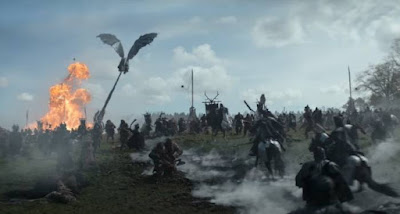A charming thief and a band of unlikely adventurers embark on an epic quest to retrieve a long-lost relic, but their charming adventure goes dangerously awry when they run afoul of the wrong people.
Pine is arguably the least charismatic of Hollywood's Chrises (Chris Evans, Chris Hemsworth, Chris Pine, and Chris Pratt), but there is something to be said about his choice of starring roles. One can't help but draw parallels to his time in the latest reboot movie franchise for Star Trek, where he played the main protagonist in a film that represents an extremely large and loyal fanbase, with content spanning generations, yet manages to be a part of something that garners mainstream appeal.
It is a clear and growing fault in the Marvel Cinematic Universe, where Disney's need to oversaturate the market and squeeze every last dollar out of its audience, has created such an interconnected universe throughout its many intellectual properties in exclusive streaming shows, and the longer format theatrical releases, that it has become a burden to keep up with, and even less appealing to attempt to enter for potential new initiates. When there is already so much content, so much community, and so much lore, it can scare away curious viewers. Pine has managed to bring new Star Trek fans through his quizzically teen-like, geeky charm-filled film trilogy, and Dungeons & Dragons: Honor Among Thieves looks like it has all the hallmarks of another well-composed flick, for the uninitiated to safely explore the realm of D&D.
Admittedly, the film takes a bit of time to fully warm up the audience. In its attempt to jam an epic adventure into a 134-minute runtime, the initial character development is scant, and the journey moves along very quickly; the first 15 minutes of the film feel more like a collection of momentous cinematic travel montages than an actual story. The interesting reality is, however, that this is not too dissimilar to what one could expect in a live D&D session; characters are created, and the campaign starts off with a fair amount of lore, but it isn't until a few events occur, that we begin to see how the characters properly integrate and learn to care for them as we see their relationships come to light.
The campaign is long, arduous, and never seems to go the way it should, and while the main beats of the film are entirely formulaic and predictable, the finer details are full of creativity and wonder. Like a fair game, every character is provided with an opportunity to excel and be in the spotlight, to have their own motivations and independent thoughts, and all of the elements are sewn together in a rich tapestry of surprisingly well-timed and fresh comedic material; while not a 100% hit-rate, there were definitely far more laughs than there were groans.
With the likes of Michelle Rodriguez, Justice Smith, Chris Pine, and Hugh Grant among the cast list, there are many familiar faces in familiar roles, and none disappoint. The audience is greeted with some impressive action choreography, some reasonable CGI (to be fair some of the more cartoony elements further help to maintain the light-hearted nature of the film), and some artful exploration of love and deception; the film isn't worthy of thematic essays, but it manages to dig a little deeper under the skin.
The third act does become a bit cumbersome, and there is a struggle to keep the film flowing as the morals and storylines come converging together all at once, but there is something delightfully refreshing and youthful about this example of cinema. It converts a large story into a manageable viewing and doesn't bog itself down in taking itself seriously. D&D is all about world-building, character-building, and finding creative solutions to problems. There are no "right" answers, all answers simply set our team on a different path, with new destinations and new problems to solve.
While there are references and creatures that will be familiar to those who have participated in the Dungeons & Dragons media previously, none of it is required to understand and appreciate what is going on onscreen. Well-balanced and light-hearted, Dungeons & Dragons: Honor Among Thieves did exactly what it set out to do, to bring back that love of adventure, of doing the wrong thing for the right reasons, and I cannot wait to see this merry band's next campaign.
Dungeons & Dragons: Honor Among Thieves is in cinemas from March 24, 2023














